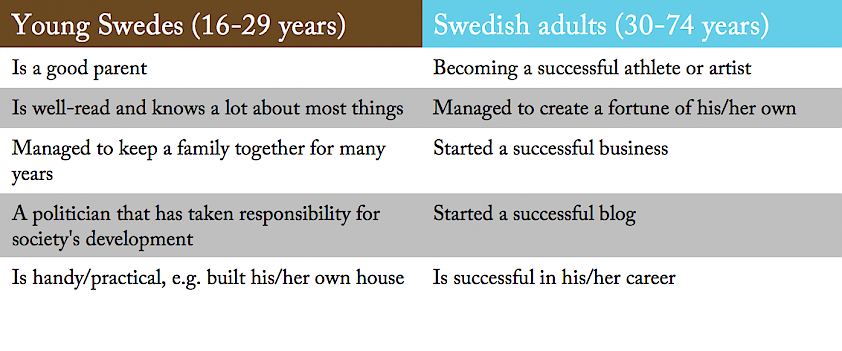When the Millennials – Or Pragma Generation – takes over
Who are they actually, the youth and young adults of today? And what will they do when they take over?
Two completely opposed perspectives dominate the discussions in media today. The first one describes today’s youth as a lazy and spoiled generation, and is represented in Joel Steins column in Time Magazine The Me Me Me generation from May 2013. He starts his article by complaining about young people, which he states is what all previous generations have done at all times. But unlike them, he claims he has evidence. Heaps of evidence. Among other things, statistics that support that this is a generation of narcissistic individuals: ”The incidence of narcissistic personality disorder is nearly three times as high for people in their 20s as for the generation that’s now 65 or older, according to the National Institutes of Health; 58% more college students scored higher on a narcissism scale in 2009 than in 1982. Millennials got so many participation trophies growing up that a recent study showed that 40% believe they should be promoted every two years, regardless of performance. … They’re so convinced of their own greatness that the National Study of Youth and Religion found the guiding morality of 60% of millennials in any situation is that they’ll just be able to feel what’s right.”
The 15-year-old book Millennials Rising: The Next Great Generation represents the opposite perspective. Here, authors Howe and Strauss build on their meta analysis of cultural shifts in the Anglo-Saxon world and forecast that Millennials, those born from the mid 80’s, will be the next “great generation”. The authors mean that this generation not only has the potential, but also are clearly destined to be “the next great generation”. According to American terminology, “the great generation” refers to the building and self-sacrificing generation that fought under the Second World War and who laid the foundations for the American welfare society. Moreover, they argue that Millennials will positively contribute to society thanks to their group-oriented and action-minded ethos, their different values and its size (the biggest since the generation born in the 60s). This generation will fracture the trends created by Generation X. At the same time, they will be perceived as a chaste antipole to the adults born in the 40s who longed for the eternal youth.
Lazy narcissists or the future society builders?
Researchers in the field of values and lifestyles use to claim that in order to understand a generation, one first has to comprehend the years and contextual environment that formed them. They usually refer to those years as the formative years, i.e. the period in life between 15-20 years old that has the biggest impact in a person’s values. For the Baby Boomers (born around 1950), these formative years were during the 60s; for the Generation Jones (born around 1960), we talk about the environmental crisis and the years of stagflation in the late 70s; for the Generation X, the market hysteria from the late 80s and for Generation Y (born 1975-84) the postmodernism and the IT frenzy from the late 90s. For the youth of today, born around 1990, the late 00s has grounded their values in a time, which, by its very nature, substantially distinguish itself from the late 90s, and even more from the 60s, 70s and 80s.
The crisis and order that shaped the millennials
If the Baby Boomers were determined by the late social and global awakening during the 60s and the Generation X by the dissolution of norms from the 80s and 90s, then the crisis heavily shaped the Millennial generation. Already the first age groups, born during the mid 80s, experienced the 9/11 when they undertook high school. Then some calmer years followed before the financial crisis hit in 2007-08. A new Great Depression emerged, and crisis, populism and political polarization praised society some years later. That was the time when the first youth born in the 90s were about to go through high school.
Thanks to Kairos Future’s consistent database following Swedes’ values since the 70s, we have the opportunity to identify value shifts and follow trends over time. The database is continuously updated with new questions in our effort to bring new perspectives and depth into our analysis. Taking the database as our starting point, we could briefly describe the 20 year old young of today as a generation who:
- Is searching for anything perceived as genuine, has difficulties in understanding irony and reject falsehood, which for example is reflected in the American Presidential Campaign, where young praise Bernie and despise Hillary
- Has experienced uncertainty at all stages of their childhood, which makes them seek control in those areas they have the ability to do so, which among other things leads to a shift in worklife values, where control, demarcation and instrumental values (such as employment safety and possibility to influence limits) is valued higher than among previous generations when they were the same age
- Has grown up in a time of youth fixation and therefore has as purpose to become adults as soon as possible
- Has parents as their role models in life, and often also as best friends
- Had all possibilities open but hence also the responsibility to succeed, which leads to a struggle between their high ambitions and aspirations and a desire to reduce stress and pressure in life. Maybe this is why they have “chilling” as their preferred free time activity
- Upgrades the value of “real professions” as civil engineer and even teacher and create a higher demand for education programs
- Is less interested in partying, drinking alcohol and smoking than their elder cousins as teens
- Dreams about the small things in life: having a nice home, a good job, a stable relation and having kids, while being adventurous lies far away down in the bucket list
- Considers that “being a good parent” and “keeping a family together for many years” is most worthy of respect, while grown ups are not getting it right at all
- Has grown up in a multi-ethnic society and have a much more positive attitude to immigration and multiculturalism than previous generations. They do not see “shaking hands” as a greeting as an obligation. But at the same time they are more sensitive for offenses against minorities.

Figure 1. Young people's main role models, 16-29 years old. Open answer. Source: Kairos Future 2016

Table 1. What young Swedes believe is most worthy of respect and what Swedish adults think youth believe is most worthy of respect. Source: Kairos Future 2016
The Millennials – A control generation?
When we already ten years ago saw a value shift coming along, we called this new generation Generation Order or the Pragma Generation. Whereas “Order”, non-rebel behaviours and a longing for adulthood were the visible external expressions of this generation, time has shown that the underlying driving force could very well be a desire for control. Is the youth of today a controlling generation in a similar way as the previous ”great generation” was? Those born around the First World War, marked by the crisis of the 20s and 30s and who guarded the frontier towards Norway during the 40s. A generation that prioritized both control in society and economy’s interactions.
What will the Millennials do?
Millennials have not overtaken the scene yet, even though they already are established in the workplace and have a strong purchasing power. It will however not take too long until they take over key positions in business and politics. The big question is whether their values, attitudes and behaviours will reshape work life and markets. What will this mean for public institutions, consumption companies and employers? How will Millennials act as consumers, citizens, politicians, employees and managers? And what will this mean for your company or organization? If you still have not thought about this, the clock is ticking.
Article written by Mats Lindgren,CEO and Founder of Kairos Future. Right now he is among other things leading Kairos Futures international youth study Global Youth, which focuses on studying the values and lifestyles of the16-29 year olds.
